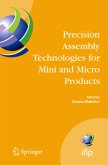This book constitutes the refereed proceedings of the Fourth International Precision Assembly Seminar (IPAS'2008) held in Chamonix, France in February 2008.
The IFIP series publishes state-of-the-art results in the sciences and technologies of information and communication. The scope of the series includes: foundations of computer science; software theory and practice; education; computer applications in technology; communication systems; systems modeling and optimization; information systems; computers and society; computer systems technology; security and protection in information processing systems; artificial intelligence; and human-computer interaction. Proceedings of refereed international conferences in computer science and interdisciplinary fields are featured. These results often precede journal publication and represent the most current research. The principal aim of the IFIP series is to encourage education and the dissemination and exchange of information about all aspects of computing.
Micro-assembly is a key enabling technology for cost effective manufacture of new generations of complex micro products. It is also a critical technology for retaining mdustrial capabilities in high labour cost areas such as Europe since up to 80% of the production cost in some industries is attributed directly to assembly processes. With the continuous trend for product miniaturisation, the scientific and technologi cal developments in micro-assembly are expected to have a significant long-term economic, demographic and social impact. A distinctive feature of the process is that surface forces are often dominant over gravity forces, which determines a number of specific technical challenges. Critical areas which are currently being addressed include development of assembly systems with high positional accuracy, micro gripping methods that take into ac count the adhesive surface forces, high precision micro-feeding techniques and mi cro-joining processes. Micro-assembly has developed rapidly over the last few years and all the pre dictions are that it will remain a critical technology for high value products in a number of key sectors such as healthcare, communications, defence and aerospace. The key challenge is to match the significant technological developments with a new generation of micro products that will establish firmly micro-assembly as a core manufacturing process.
The IFIP series publishes state-of-the-art results in the sciences and technologies of information and communication. The scope of the series includes: foundations of computer science; software theory and practice; education; computer applications in technology; communication systems; systems modeling and optimization; information systems; computers and society; computer systems technology; security and protection in information processing systems; artificial intelligence; and human-computer interaction. Proceedings of refereed international conferences in computer science and interdisciplinary fields are featured. These results often precede journal publication and represent the most current research. The principal aim of the IFIP series is to encourage education and the dissemination and exchange of information about all aspects of computing.
Micro-assembly is a key enabling technology for cost effective manufacture of new generations of complex micro products. It is also a critical technology for retaining mdustrial capabilities in high labour cost areas such as Europe since up to 80% of the production cost in some industries is attributed directly to assembly processes. With the continuous trend for product miniaturisation, the scientific and technologi cal developments in micro-assembly are expected to have a significant long-term economic, demographic and social impact. A distinctive feature of the process is that surface forces are often dominant over gravity forces, which determines a number of specific technical challenges. Critical areas which are currently being addressed include development of assembly systems with high positional accuracy, micro gripping methods that take into ac count the adhesive surface forces, high precision micro-feeding techniques and mi cro-joining processes. Micro-assembly has developed rapidly over the last few years and all the pre dictions are that it will remain a critical technology for high value products in a number of key sectors such as healthcare, communications, defence and aerospace. The key challenge is to match the significant technological developments with a new generation of micro products that will establish firmly micro-assembly as a core manufacturing process.









